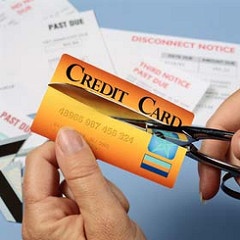Now that you’ve made the decision to enroll in a debt settlement program, what happens next?

Once you have looked at all of your options and decided to enroll in a debt settlement program, you cannot just sit back and do nothing.
Here is what you need to be doing:
Debt Settlement is the best option for those who have accumulated too much debt and cannot keep up with the minimum required payments.
In a nutshell, most (if not all) of your unsecured accounts will ultimately be turned over to a collection agency. This unusally occurs about 120-180 days from your last payment.
At first, you will get several calls and letters from the debt collector.
These calls can be very frustrating and annoying, so you should take advantage of a law from the Fair Debt Collection Practices Act (FDCPA) that says that if you make a written request to the debt collector to stop calling you, they must stop or face very serious fines from the Federal Trade Commission! Here’s how to do that:
{{cta(‘2b552877-2cf3-4547-a27d-b4e4583adac6′,’justifycenter’)}}
If the calls do not stop, then you should contact your state’s attorney general’s office to file a complaint. If you live in Oregon (as we do), here is the link:
How to File a Complaint with the Oregon
You will continue to receive letters from the debt collector.
It is VERY IMPORTANT that you send the latest letter (s) to the Debt Settlement Company you have retained to negotiate settlements for you.
The easiest and fastest way to do this is by email or fax. But, if you cannot email or fax, then you can mail the letters.
When you enrolled in the debt settlement program, you stopped making payments to your creditors (most likely, you had done so already) and began making a payment to a FDIC Insured Settlement Reserve Account through your debt settlement company.
As your fund grows, the negotiator will begin contacting your creditors to work out a reasonable settlement.
Depending on a number of circumstances, your settlement should be somewhere around 50% of the current balance.
If your reserve account has enough funds, the settlement may be paid in a lump sum.
But, if not, a good negotiator can still negotiate a very good settlement and pay it over a period of time (with no additional interest or fees).
Here are a few examples of actual settlements we have negotiated for our clients:
{{cta(’18c7ed38-af56-42be-a60b-3aa0b2b83b77′,’justifycenter’)}}
Once a settlement has been completed, the creditor/debt collector is supposed to report that the account has a $0 balance and was “settled-as-agreed” to the three major Credit Reporting Bureaus…. Equifax, TransUnion and Experian.
Unfortunately, not all debt collection agencies follow through and your credit report may be showing incorrect information.
About 2 months after the settlement is completed, you should request a FREE Credit Report to make sure it is being reported correctly.
Click on this link to request a Free Credit Report:
Your debt settlement company will provide you with proof of payment and help you open and complete a dispute.
Sometimes, a debt collector may decide to FILE A CLAIM with your county court about your debt.
If this happens, you will receive a SUMMONS.
Please DON’T PANIC!
The summons will state that you have a limited time to APPEAR AND ANSWER the claim against you.
It sounds like you will have to go to court, but this is not so.
An ANSWER is a legal response to the CLAIM that you can prove that you do not owe the debt.
Most of the time you know you owe the debt and therefore you will not need to do anything.
Again, and this is VERY IMPORTANT, if you receive a summons, contact your debt settlement representative right away!!!!
The debt settlement company will contact the attorney for the debt collector and most likely will still work out a reasonable settlement.
I can’t stress enough how important it is NOT TO IGNORE a summons.
After helping people for 15 years, the only time a client has a WAGE GARNISHMENT or BANK LEVY is that they failed to inform us that they had received a SUMMONS!
A quality, professional debt settlement company should welcome and answer any questions or concerns you may have.
You should be able to contact them via phone or email and receive a reply in a short period of time.
Here are some things to look for in a Debt Settlement Company
As time goes by, one by one, your debt will be settled. Depending on the total amount of debt you had and how much you could afford to deposit into your settlement reserve account, your program may take anywhere from 36 – 60 months.
Remember….
The goal of debt settlement is to…
- protect you from wage garnishments or bank levy
- prevent you from having to resort to bankruptcy
- help get you out of debt
Yes, getting settlements that substantially reduce the balances is great, but not necessarily the main goal.
FINALLY:
A good communication line between you and your debt settlement representative is critically important to a successful program.
Although it may seem like it is taking a long time, ultimately you will be debt free and your credit scores will begin to improve…but it just doesn’t happen over night!
Here is what some of our former clients have said:
If you are just beginning your search for information about debt settlement, we can help. Just click on the button below:
{{cta(‘450c6e10-cb6c-4146-bc59-eeb5218bddaf’)}}


Leave a Reply
You must be logged in to post a comment.